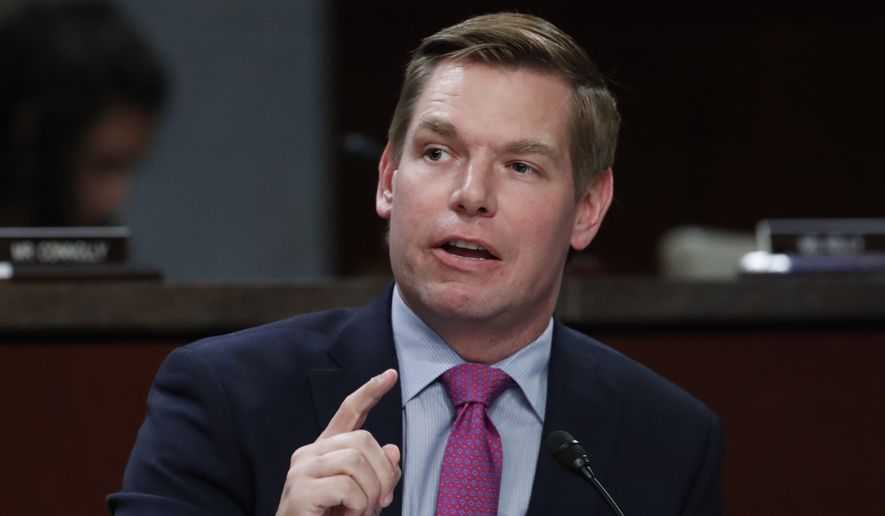Rep. Eric Swalwell isn’t shying away from his interest in running for the White House, even as some of the likely 2020 Democratic presidential contenders play it coy about their political futures.
The California Democrat is among a number of lesser-known figures testing the waters for a presidential run, ahead of what activists in early primary states say is likely to be a rush to declare candidacies early next year.
“If I were a lesser-known person at this point, I would be as open as possible about my ambitions because I think there will be a deluge of candidates and big names jumping in pretty quickly,” said Sean Bagniewski, chairman of the Polk County Democrats in Iowa. “I think you know who the big names are likely to be this caucus season, and you might see literally a dozen people trying to see if they can be the breakout star.”
That could be critical amid a field that is shaping up as the highest-powered in American history, with a former vice president, a former attorney general, a former first lady and secretary of state, a former national security adviser, one or two billionaires and at least eight senators signaling interest.
Mr. Swalwell had campaign people in Iowa in the run-up to the midterms and has made numerous trips to the state where he grew up and where he said he has been listening to voters and sharing ideas as he prepares to make “a big decision.”
“I’m considering running — seriously,” Mr. Swalwell told The Washington Times. “Leading the country starts with making the case in Iowa.”
He will return to Des Moines this month to headline the holiday party for Progress Iowa, a liberal group, with three other possible contenders: Sen. Jeff Merkley of Oregon, South Bend, Indiana, Mayor Pete Buttigieg and businessman Andrew Yang.
Mr. Yang and Rep. John K. Delaney of Maryland, who has had a strong presence in the state, have already started campaigning. West Virginia state Sen. Richard Ojeda also has thrown his hat into the ring.
A long list of others are thought to be exploring underdog bids, including former Housing and Urban Development Secretary Julian Castro, Rep. Tulsi Gabbard of Hawaii, Mayor Eric Garcetti of Los Angeles, Gov. Steve Bullock of Montana, former Massachusetts Gov. Deval Patrick and author Marianne Williamson.
The former campaign finance manager for Sen. Sherrod Brown also has put out feelers for the Ohio Democrat, and activists say former New York Mayor Michael R. Bloomberg is slated to be in Des Moines on Tuesday.
David Yepsen, who covered Iowa politics as a journalist for decades, said having the early contests in Iowa and New Hampshire, two relatively cozy states, is that obscure candidates can compete just by having energy and a convincing message.
He said Mr. Delaney, for example, has visited all 99 Iowa counties. “While he’s not well-known outside Iowa, he’s becoming better-known to Iowa Democratic activists,” he added.
The best example of an obscure candidate’s breakthrough was Jimmy Carter’s performance in 1976, Mr. Yepsen said.
“Unknown candidates have an advantage because of the ’expectations game,’” he said. “No one expects them to do well, so if they do better than expected, that’s called news to reporters and generates media attention for them.”
A lot of media attention lately has been on Rep. Beto O’Rourke after his near victory over Republican Sen. Ted Cruz in Texas.
“Everyone wants to know about Beto,” Mr. Bagniewski said. “They don’t have a team they have been building for a year or two years. All the attention is on them.”
Former Vice President Joseph R. Biden, as well as Sens. Kamala D. Harris of California, Elizabeth Warren of Massachusetts and Corey A. Booker of New Jersey also are creating buzz and have started hiring operatives or are surrounding themselves with people who are well-connected in the state.
“Things are starting to pick up,” said Bret Niles, chairman of the Linn County Democrats in eastern Iowa.
The postelection action also has gradually picked up New Hampshire, home to the first-in-the-nation primary, where likely candidates are looking to reach out to activists.
“We’ve gotten so many calls that American Airlines may have to add an additional flight into Manchester,” said Neil Levesque, director of the New Hampshire Institute of Politics at St. Anselm College. “The election created a bit of euphoria amongst Democrats, and New Hampshire is the perfect place to try out your message and ability to gain traction.”
With such a massive field forming and more liberal choices, there is a mounting sense that Sen. Bernard Sanders of Vermont might have peaked in 2016.
“I think most people who were big Bernie supporters that I meet on campus are still like, ’I like Bernie, but I don’t want him to run again,’” said Taylor Blair, president of the College Democrats at Iowa State University. “They want something new.”
That could provide an opening for Mr. Swalwell, who said he comes from a generation that he sees as the most inventive and optimistic, and wants big solutions for the nation’s health care, environmental and gun violence problems.
“I think most Americans just want you to be straight with them, too,” he said, alluding to his interest in running. “There is no sense in being shy about wanting to help people.”
• Seth McLaughlin can be reached at smclaughlin@washingtontimes.com.




Please read our comment policy before commenting.